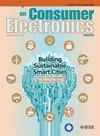Federated Learning-Based Secure Computing Mechanism for Consumer Internet of Vehicles-Based Transportation Cyber-Physical Systems
IF 10.9
2区 计算机科学
Q1 ENGINEERING, ELECTRICAL & ELECTRONIC
引用次数: 0
Abstract
Ensuring reliable and efficient transportation in Cyber-Physical Systems (CPS) requires effective model training across distributed Consumer Internet of Vehicles (CIOV)-based Transportation CPS (TCPS). However, the high mobility of transportation terminals and frequent domain switching during training degrade global model accuracy, while malicious terminals uploading erroneous data further compromise system reliability. To address these challenges, this paper proposes Fed-ECC, a two-tier federated learning (FL)-based edge collaborative computing mechanism for dynamic CIOV-based TCPS. The first tier employs a deep reinforcement learning (DRL)-based clustering algorithm to form edge collaborative computing domains, optimizing terminal selection based on mobility, computational capability, and reliability. The second tier integrates a semi-asynchronous local aggregation mechanism with adaptive aggregation factors and an asynchronous regional aggregation mechanism based on data volume, improving aggregation efficiency and model convergence. Simulation results demonstrate that Fed-ECC enhances global model accuracy by 58.7%, accelerates convergence speed by 57.6%, and achieves 95% accuracy in traffic safety tasks, significantly improving obstacle detection and service reliability. These findings underscore the effectiveness, scalability, and robustness of Fed-ECC in addressing the challenges of high-mobility, large-scale CIOV-based TCPS.基于联邦学习的消费者车联网交通信息物理系统安全计算机制
确保网络物理系统(CPS)中可靠和高效的运输需要有效的模型培训,跨分布式消费者车辆互联网(CIOV)运输CPS (TCPS)。然而,运输终端的高移动性和训练过程中频繁的域切换降低了全局模型的准确性,而恶意终端上传错误数据进一步降低了系统的可靠性。为了解决这些挑战,本文提出了Fed-ECC,一种基于两层联邦学习(FL)的边缘协作计算机制,用于基于civ的动态tcp。第一层采用基于深度强化学习(deep reinforcement learning, DRL)的聚类算法,形成边缘协同计算域,基于移动性、计算能力和可靠性对终端选择进行优化。第二层集成了具有自适应聚合因子的半异步局部聚合机制和基于数据量的异步区域聚合机制,提高了聚合效率和模型收敛性。仿真结果表明,Fed-ECC算法将模型全局精度提高58.7%,收敛速度提高57.6%,在交通安全任务中准确率达到95%,显著提高了障碍物检测和服务可靠性。这些发现强调了Fed-ECC在解决高移动性、大规模基于civ的TCPS挑战方面的有效性、可扩展性和稳健性。
本文章由计算机程序翻译,如有差异,请以英文原文为准。
求助全文
约1分钟内获得全文
求助全文
来源期刊
CiteScore
7.70
自引率
9.30%
发文量
59
审稿时长
3.3 months
期刊介绍:
The main focus for the IEEE Transactions on Consumer Electronics is the engineering and research aspects of the theory, design, construction, manufacture or end use of mass market electronics, systems, software and services for consumers.

 求助内容:
求助内容: 应助结果提醒方式:
应助结果提醒方式:


